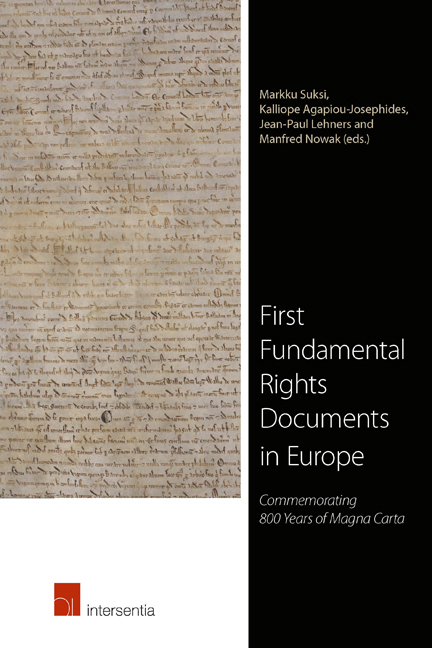Book contents
- Frontmatter
- Preface
- Contents
- List of Authors
- 1 Introduction
- PART I
- 2 The United Kingdom: From Magna Carta 1215 to the Rule of Law
- 3 Ireland: Individual and Group Rights in Ancient Irish Law
- 4 Italy: The Liber Paradisus — A Vision of Good Governance
- 5 Hungary: The Historic Constitution as the Place of Memory
- 6 Belgium: From Collective Privileges to Individual Rights
- 7 Austria: Manorial Regulation of Mining and Use of Forests as Potential Antecedents in Fundamental Rights
- 8 Spain: The First Cry for Justice in the Americas — From Antonio de Montesinos to the Laws of Burgos (1512)
- 9 Lithuania: From Equality to Inequality and to Equality Again
- 10 Poland: From the Golden Liberty of the Nobles to Fundamental Rights
- PART II
- Index
3 - Ireland: Individual and Group Rights in Ancient Irish Law
from PART I
Published online by Cambridge University Press: 15 December 2017
- Frontmatter
- Preface
- Contents
- List of Authors
- 1 Introduction
- PART I
- 2 The United Kingdom: From Magna Carta 1215 to the Rule of Law
- 3 Ireland: Individual and Group Rights in Ancient Irish Law
- 4 Italy: The Liber Paradisus — A Vision of Good Governance
- 5 Hungary: The Historic Constitution as the Place of Memory
- 6 Belgium: From Collective Privileges to Individual Rights
- 7 Austria: Manorial Regulation of Mining and Use of Forests as Potential Antecedents in Fundamental Rights
- 8 Spain: The First Cry for Justice in the Americas — From Antonio de Montesinos to the Laws of Burgos (1512)
- 9 Lithuania: From Equality to Inequality and to Equality Again
- 10 Poland: From the Golden Liberty of the Nobles to Fundamental Rights
- PART II
- Index
Summary
INTRODUCTION
The historical roots of early Irish law stretch back into antiquity and were passed on in the rich oral history, poetry, sagas, law and wisdom-texts, that have come down to us. The body of law is frequently referred to as Brehon Law, so-called as it was applied by judges named breitheamhuin or brehons, in the Irish language. The more appropriate term is fénechas defined as ‘law of the Féni [freemen], customary or traditional law, [or] native law’. Promulgated or written law, much of it developed by the church, was known as Cáin law.
The primary old Irish law-text is the Senchas Már (great tradition). This grounding document constitutes a third of all surviving law-texts. Reputedly originally assembled at the insistence of St. Patrick in the fifth century of the common era (CE), the Senchas Már as we now know it was compiled in the seventh century CE and brings together a number of distinct texts, addressing a range of civil and political as well as economic and social matters. An understanding of old Irish law also requires recourse to a wide range of other law-texts, as well as oral tradition captured in the sagas, poems and wisdom-texts. Law-texts on issues as diverse as the law of bee-keeping, the status of poets (who were key to the learning and transmission of the law), the principal remedies for civil and criminal harm, and canon law demonstrate the breadth and depth of old Irish law.
Although law in Ireland was not primarily legislative or king-made there was long tradition of national and local assemblies, such as the Féis of Tara, which may have served to ‘preserve [customary] laws and rules’. While kings could issue ordinances in times of emergency, law was primarily derived from custom and was found and interpreted by the legal class (poets and brehons) with strong clerical influences — an influence probably exercised by druids in earlier times. Though justice was primarily adjudicated by brehons, kings were linked to the process and may have adjudicated certain cases and/or played a role in approving the decision of a brehon. The Senchas Már shows the significant influence of the church in revision of the law and may be seen as the end result of a collaborative process to reconcile ‘native oral custom with written Christian doctrine’.
- Type
- Chapter
- Information
- First Fundamental Rights Documents in EuropeCommemorating 800 Years of Magna Carta, pp. 25 - 38Publisher: IntersentiaPrint publication year: 2015



